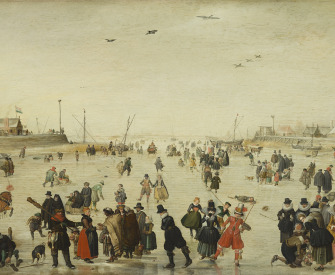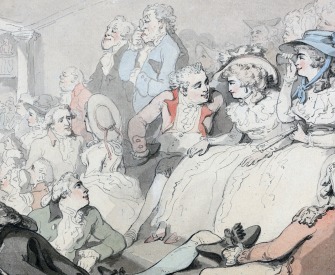Laughter always arises from a gaiety of disposition, absolutely incompatible with contempt and indignation.
—Voltaire, 1736Roots of Laughter
Laughter is an uncontrolled discharge of energy that commands the entire body.
Why do we smile when a child puts on a man’s hat? What induces us to laugh on reading that the corpulent Edward Gibbon was unable to rise from his knees after making a tender declaration? The usual reply to such questions is that laughter results from a perception of incongruity.
Even were there not on this reply the obvious criticism that laughter often occurs from extreme pleasure or from mere vivacity, there would still remain the real problem—how comes a sense of the incongruous to be followed by these peculiar bodily actions? Some have alleged that laughter is due to the pleasure of a relative self-elevation, which we feel on seeing the humiliation of others. But this theory, whatever portion of truth it may contain, is, in the first place, open to the fatal objection—that there are various humiliations to others which produce in us anything but laughter, and in the second place, it does not apply to the many instances in which no one’s dignity is implicated, as when we laugh at a good pun. Moreover, like the other, it is merely a generalization of certain conditions to laughter and not an explanation of the odd movements which occur under these conditions. Why, when greatly delighted or impressed with certain unexpected contrasts of ideas, should there be a contraction of particular facial muscles and particular muscles of the chest and abdomen? Such answer to this question as may be possible can be rendered only by physiology.
That laughter is a display of muscular excitement, and so illustrates the general law that feeling, passing a certain pitch, habitually vents itself in bodily action, scarcely needs pointing out. It perhaps needs pointing out, however, that strong feeling of almost any kind produces this result. It is not a sense of the ludicrous only which does it, nor are the various forms of joyous emotion the sole additional causes. We have, besides, the sardonic laughter and the hysterical laughter, which result from mental distress; to which must be added certain sensations, as tickling, cold, and some kinds of acute pain.
Strong feeling, mental or physical, being then the general cause of laughter, we have to note that the muscular actions constituting it are distinguished from most others by this: that they are purposeless. In general, bodily motions that are prompted by feelings are directed to special ends, as when we try to escape a danger or struggle to secure a gratification. But the movements of chest and limbs which we make when laughing have no object. And now remark that these quasi-convulsive contractions of the muscles, having no object but being results of an uncontrolled discharge of energy, we may see whence arise their special characters—how it happens that certain classes of muscles are affected first, and then certain other classes. For an overflow of nerve force, undirected by any motive, will manifestly take first the most habitual routes and, if these do not suffice, will next overflow into the less habitual ones. Well, it is through the organs of speech that feeling passes into movement with the greatest frequency. The jaws, tongue, and lips are used not only to express strong irritation or gratification, but that very moderate flow of mental energy which accompanies ordinary conversation finds its chief vent through this channel. Hence it happens that certain muscles round the mouth, small and easy to move, are the first to contract under pleasurable emotion. The class of muscles which, next after those of articulation, are most constantly set in action (or extra action, we should say) by feelings of all kinds, are those of respiration. Under pleasurable or painful sensations we breathe more rapidly: possibly as a consequence of the increased demand for oxygenated blood. The sensations that accompany exertion also bring on hard breathing, which here more evidently responds to the physiological needs. And emotions, too, agreeable and disagreeable, both, at first, excite respiration; though the last subsequently depress it. That is to say, of the bodily muscles, the respiratory are more constantly implicated than any others in those various acts which our feelings impel us to; and hence, when there occurs an undirected discharge of nervous energy into the muscular system, it happens that, if the quantity is considerable, it convulses not only certain of the articulatory and vocal muscles but also those which expel air from the lungs.
Should the feeling to be expended be still greater in amount—too great to find vent in these classes of muscles—another class comes into play. The upper limbs are set in motion. Children frequently clap their hands in glee; by some adults the hands are rubbed together, and others, under still greater intensity of delight, slap their knees and sway their bodies backward and forward. Last of all, when the other channels for the escape of the surplus nerve force have been filled to overflowing, a yet further and less used group of muscles is spasmodically affected: the head is thrown back and the spine bent inward—there is a slight degree of what medical men call opisthotonos. Thus, then, without contending that the phenomena of laughter in all their details are to be so accounted for, we see that in their ensemble they conform to these general principles—that feeling excites to muscular action; that when the muscular action is unguided by a purpose, the muscles first affected are those which feeling most habitually stimulates; and that as the feeling to be expended increases in quantity, it excites an increasing number of muscles in a succession determined by the relative frequency with which they respond to the regulated dictates of feeling.

Herbert Spencer
From “The Physiology of Laughter.” The philosopher and social theorist reflected on this essay in his autobiography, “It was evolutionary as being an explanation of laughter in terms of those nervo-muscular actions…and especially as using for a key the law that motion follows the line of least resistance.” Seven years before publishing his thoughts on laughter—six years before Charles Darwin’s On the Origin of Species appeared—Spencer coined the phrase “survival of the fittest” in an article that speculated that birth rates would decline as civilization developed and advanced.


